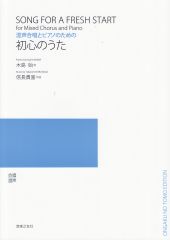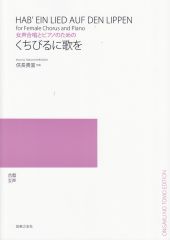Upper Voices Anthology 1 is a collection of ten pieces, rated 'easy', selected from amongst the most popular titles in the 'Choral Vivace' series. This anthology, along with its three companion anthologies, represents a new and cost-effective way for choirs to purchase a graded selection of popular titles for inclusion in their repertoire. Each of the titles in the anthology is also available for separate purchase.
Composer: MILLIKEN, Sandra (1961-)
Publisher: Peter
Instrumentation: SSAA div. / a cappella / piano accompaniment
Language: Latin / English / Vocalise
Contetn:
Stand by our Side / If I Open the Door / Sleep and Dream
Sing, Sing for Water / The Squirrel / Missa piccola
Dona nobis pacem / Dormi, Jesu! / Cantate Domino
Panis Dei
*Choral Vivace is a major new choral series by the internationally-acclaimed Australian composer Sandra Milliken. A noted choir director, clinician, adjudicator, accompanist and singing teacher, Sandra Milliken's work is ideally written for voices, and is particularly appealing to youth choirs.
The Choral Vivace series:
- a varied collection of choral music for upper, mixed and lower voice choirs
- graded into three levels -easy, intermediate and advanced
- ideal for both youth and adult choirs, either unaccompanied or with piano
View product details or purchase

Upper Voices Anthology 2 is a collection of seven pieces, rated 'Intermediate/advanced', selected from amongst the most popular titles in the 'Choral Vivace' series. This anthology, along with its three companion anthologies, represents a new and cost-effective way for choirs to purchase a graded selection of popular titles for inclusion in their repertoire. Each of the titles in the anthology is also available for separate purchase.
Composer: MILLIKEN, Sandra (1961-)
Publisher: Edition Peters
Instrumentation: SSAA div. / a cappella / piano accompaniment
Language: Latin / English / Vocalise
Content:
Anthem / Bus Ride / Laudate omnes stellae luminis / Music Comes /
Snowflakes / Tango in 5 / Laudate eum solo et luna
View product details or purchase
It is a special choral suite for SSA choir with guitar accompaniment. The suite starts with Summer that serves as a happy and smooth opener with uncomplicated text. Choirs should pay particular attention to the tone D. The major and minor harmonies provide various colours in the sound.
In contrast, Autumn exudes a serene atmosphere. With the continuously broken chord of guitar, there are three long melodic voices with tension. The harmonies are a nice unit with reflective lyrics.
In Winter, guitar almost constantly keeps a pedal tone (= Mi). It symbolizes desolate silence and coldness in a musical way. The 12/8 meter showcases a variety of 'verse-chorus' where the verse melody is first recited in unison, then in canon and in three double canon for the third time. This gives the section a 'contrapuntal'intensity. At the end, it folds back completely with the word 'death' being repeated three times.
After a short instrumental introduction, the choir playfully presents text fragments in Spring. Then comes the cheerful main melody supported by the ostinato-like guitar rhythm. There are some erratic melodies and harmonies that incidentally reflect the season itself. Especially between bar 59 figure ('piu legato') and 73 the harmonic transition changes are rather quick and surprising. The work ends with words related to the picturesque spring: life, growth, etc. It will be a new experience for female choir to sing this suite in the concert.
Composer: VAN DER ROOST, Jan (1956-)
Publisher: Euprint
Instrumentation: SSA / guitar accompaniment (auitar score included)
Language: English
*Eurprint
Established in 1989 in Leuven, Belgium, EUPRINT publishes classical music of contemporary Belgian composers. Currently, their catalogue includes approximately 2,500 titles half of which is choral music. Among the composers, there are names well known on an international level: Vic Nees, Kurt Bikkembergs, Ludi Claesen, Jan Van der Roost and many more. EUPRINT has organized sessions or participated in such events as Europa Cantat 2009 and Chateauroux 2014.
View product details or purchase

Collection 'Motetti Sanctorum' has 10 short sacred choral works for three parts male choir. The composers use Gregorian chants as music elements based on which music develops with various styles. It makes every piece so unique that the listeners feel like watching a kaleidoscope. Besides, the songs request high singing techniques. It is the matter of the singers' trainings how to keep precise pitch, harmony and rhythm.
Track 6 of the CD "Compositiewedstrijd 2007"
Composer: BIKKEMBERGS, Kurt (1963-)
Publisher: Euprint
Instrumentation: TBB / a cappella
Language: Latin
Content:
Beati mundo cordi / Ecce sacerdos magnus / Introibo ad altare Dei /
Ego vos elegi de mundo / Introibo ad altare Dei /
Inveni David servum meum /Qui manducat carnem meam /
Sacerdotes Dei, benedicite Dominum / Scio cui credidi /
Stetit Angelus / Veritas mea
*Composer and conductor Kurt Bikkembergs was born in Hasselt in 1963. After graduating in music teaching, composition and choral and orchestral conducting at the Lemmens Institute in Louvain, he pursued his training in international master classes in Belgium and Austria. He currently serves as a choirmaster and professor of choral conducting and composition at LUCA-ARTS campus of Lemmens Institute in Leuven, artistic director of the Capella di Voce and the Dutch Student Chamber Choir, and a guest conductor of the Flemish Radio Choir. He is an active member of Europa Cantat and the International Festival for the Youth in Neerpelt. As a composer, Bikkembergs strives to renew vocal music, in particular the religious one, by adding personal experiences without neglecting tradition. His compositions include all kinds of choir music, chamber and ballet music, three oratorios, a couple of cantatas as well as orchestral works.
View product details or purchase

'Une priere interieure' means 'inner pray'. Composer Claesen used the famous French melody and arranged it into a beautiful mixed choral piece. The moderato e sostenuto tempo creates a sincere atmosphere, while simple verse-repeating structure of the music symbolizes the cycling pray and rich harmony shows the desire of human's heart. French language gives the song an elegant flavour. Both singers and listeners will be touched by the energy flowing from the music. This is a good choice as an encore piece on stage.
Track 2 of the CD "Compositiewedstrijd 2007"
Arranger: CLAESEN, Ludo (1956-)
Publisher: Euprint
Instrumentation: SATB div. / a cappella
Language: French
View product details or purchase
This is a famous Swedish folk song. People are familiar with the arrangement of Hugo Alfvén. Not only traditional choruses, but also contemporary a cappella groups such as The Real Group often interpret this beautiful song in their concerts. This piece describes the landscape of the pasture where various flowers are dancing in the soft wind. The song begins with the word 'kom' (come) that is repeated in different parts of the song. It seems like an invitation for people to join the scene and reflects the happiness of the people in love. This arrangement is written for two parts female choir a cappella. Clear harmony represents pure hearts, while soprano melody weaves with the alto line to create a feeling of the surrounding love.
Track 9 of the CD "Compositiewedstrijd 2007"
Arranger: SOMMEREYNS, Gwendolyn (1982-)
Publisher: Euprint
Instrumentation: SA / a cappella
Language: Swedish
Duration: 2'19"
View product details or purchase
This arrangement is based on the melody of the traditional Irish Blessing, an ancient Celtic prayer. Celtic literature is known for using images of nature and everyday life to speak of how God interacts with His people. The lyric of 'May The Road Rise Up to Meet You' is about God's blessing for your journey. It alludes to three images from nature - wind, sun and rain - as pictures of God's care and provision. As such, this prayer is a good blessing for wedding ceremonies. The arrangement begins with a light forwarding accompaniment and then the voices flow with the piano. The elegant music atmosphere is suitable for children's choir.
Compoer: SLOOTMAEKERS, Martin (1968-)
Publisher: Euprint
Instrumentation: SA / piano accompaniment
Language: English
Duration: 2'30"
View product details or purchase
CD 'Compositiewedstrijd 2007' is one of the results produced in the composition contest Concours National de Composition pour Choeur (National Competition of Composition for Chorus) that was organized by EUPRINT in 2007. In this CD, one can find the works of both the contests winners (Ludo Geloen, Hans Aerts and Yvan Vander Sanden) and jury members (Jacqueline Fontyn, Roland Coryn, Luc Van Hove and the chairman Kurt Bikkembergs). Listeners will discover the essence of the Belgian choral music while enjoying a special Flemish music feast at the same time.
*National Competition of Composition for Chorus is a joint initiative of Capella di Voce and Editions Euprint. Vocal group Capella di Voce dedicates itself to contemporary choral music and Editions Euprint publishes contemporary music (both vocal and instrumental). This competition encourages composers to create new compositions. Both Capella di Voce and Euprint give prizes for a mixed a cappella choral piece and for equal voices. The abbey of Keizersberg also awards the Prize of Sacred Choral Music.
Label: Euprint
Conductor: Kurt Bikkembergs
Choir: Capella di Voce
Content:
Het was een maged uitvercoren (J.Fontyn)
Une piere interieure (L.Claesen)
Ubi caritas (L.Geloen)
Media vita (L.Geloen)
In manus tuas (L.Geloen)
Veritas mea (K.Bikkembergs)
Christus factus est (S.v.Steenberge)
Eternity (M.Slootmaekers)
Uti var hage (G.Sommereyns)
Carillon (R.Coryn)
Avondgeluiden (H.Aerts)
Herbst (K.Bikkembergs)
Nacht-stilte op.7 (L.V.Hove)
Two days in a life (Y.V.Sanden)
View product details or purchase

Born in 1977 in Latvia, Eriks Esenvalds is an original and sought-after voice of the Baltic music tradition. Commissioners include the Latvian Radio Choir and State Choir 'Latvija', the Britten Sinfonia, Trinity College Choir Cambridge, Temple University (USA), the Boston Symphony Orchestra and City of Birmingham Symphony Orchestra. His works have been recorded on a number of CDs. Eriks Esenvalds is a former Fellow Commoner in Creative Arts at Trinity College, University of Cambridge.
The Eriks Esenvalds Choral Anthologies 1 & 2 were so successful that Musica Baltica kept collaborating with Edition Peters to present No. 3 and No 4. No. 3 is a collection for upper voices that presents the best-selling works of the composer. Many songs already have the mixed choir versions.
Composer: ESENVALDS, Eriks (1977-)
Publisher: Edition Peters
Instrumentation: SSAA div. / a cappella / Glass harp / piano accompaniment
Language: English / Latin / Latvian
Content:
Northern Lights / Stars / Ubi Caritas Et Amor /
Benedictus Es / O Salutaris Hostia (revised version) /
Spring, The Sweet Spring / Who Can Sail Without The Wind /
Gaujas Meita Rotataja
View product details or purchase

Born in 1977 in Latvia, Eriks Esenvalds is an original and sought-after voice of the Baltic music tradition. Commissioners include the Latvian Radio Choir and State Choir 'Latvija', the Britten Sinfonia, Trinity College Choir Cambridge, Temple University (USA), the Boston Symphony Orchestra and City of Birmingham Symphony Orchestra. His works have been recorded on a number of CDs. Eriks Esenvalds is a former Fellow Commoner in Creative Arts at Trinity College, University of Cambridge.
The Eriks Esenvalds Choral Anthologies 1 & 2 were so successful that Musica Baltica kept collaborating with Edition Peters to present No. 3 and No 4. No. 4 is a collection for mixed choir that includes the Latin and English pieces. Whether the songs are accompanied with Water-tuned Glasses, Chimes, Jew's Harp, piano, or it is an a cappella piece, all show the special music style of this composer. It is an exciting anthology.
Composer: ESENVALDS, Eriks (1977-)
Publisher: Edition Peters
Instrumentation: SATB div. / a cappella / Glass harp / piano / other accompaniment
Language: English / Latin
Content:
Magnificat / Nunc Dimittis / Northern Lights /
Rivers of Light / The Heavens' Flock /
The New Moon / The Earthly Rose / Psalm 67
View product details or purchase

Latvia has been portrayed by promoters of tourism as "The Land that Sings", and its strong choral traditions, in particular massive song festivals that take place every five years, confirm that this is no vain journalistic hyperbole. Although music for mixed and male voice choirs formed the backbone of Latvian choral repertory for many years, female choirs in Latvia have achieved great popularity at home and remarkable success abroad. Composers responded to this with interest and wrote some wonderful music for female choir. Help for non-Latvian singers is provided by including English translations for most of the songs. Nevertheless, it is hoped that once the choirs become familiarized with the songs, they will try to sing the original Latvian text by using the pronunciation guide and notes. This would give a true Latvian flavour to the performance.
Publisher: Edition Peters
Instrumentation: SSA div. / a cappella / piano accompaniment
Language: Latin / English / Latvian
Content:
Skaista Mana Brala Seta (Jekabs Graubins)
Dziedu Kosi Locidama (Jekabs Graubins)
Pie Dievina Gari Galdi (Romualds Jermaks)
Saulit'Velu Vakarai (Andris Sejans)
Juras Mate (Rihards Dubra)
Veja Mate (Valdis Zilveris)
Dindaru, Dandaru, Ozolini (Valdis Zilveris)
Dancasanas Dziesma (Austrina)
Kas Pa Mezu Sraida (Andris Kontauts)
Melodijas (Emilis Melngailis)
Pasacina (Peteris Barisons)
Supla Dziesma (Helmers Pavasars)
Pulkstendarbnica (Austrina)
Viva La Musica (Ilze Arne)
Laudate Dominum (Rihards Dubra)
Lugsana (Bruno Skulte)
Benigna Domina (Selga Mence)
View product details or purchase

Baltic choral music has undergone a massive resurgence in recent years. Sacred choral music, in particular, has flourished since the end of the Soviet era with composers such as Eriks Esenvalds (*1977) and Richard Dubra (*1964) achieving international recognition. This collection of choral music brings together a number of pieces including the works by Esenvalds and Dubra, and a varied selection of Latvian poetry. It covers a range of difficulty, from simple pieces for young singers to more challenging works for adult choirs.
Publisher: Peters
Instrumentation: SSAA / a cappella / piano accompaniment
Language: Latin / English / Latvian
Content:
Aizalaida Sauleite (Juris Vaivods)
Lai Bij'gruti, Kam Bij' gruti (Alberta Jerums)
Pavasara Rotasana (Selga Mence)
Mistat Linus, Mistitaji (Peteris Plakidis)
Two Songs Of Ophelia (Pauls Dambis)
Lietus Virins (Ruta Vintule)
Laudate (Rihards Dubra)
Gloria Patri (Romualds Jermaks)
Kyrie Eleison (Leons Amolins)
O Salutaris Hostia (Eriks Esenvalds)
Ave Maria (Maija Einfelde)
View product details or purchase

The composer Jean (Johan) Sibelius is regarded as one of the great symphonists and tone poets of the 20th century.
He came from a Swedish-speaking home, but passed his matriculation examination at a Finnish-speaking school: Hameelinna Lyceum. Following his matriculation exam, Sibelius enrolled at the Helsinki Music School, where he studied violin, theory of music and composition. Further studies followed in Berlin and Vienna under Adolf Becker and Karl Goldman, among others. In time, Sibelius' dreams of a career as a violinist faded, and he began to concentrate exclusively on composition. He also conducted, mostly his own works, in Finland and elsewhere in Europe and in America.
Sibelius began to make a name for himself in the music centers of the world from the start of the century. His tone language evoked a positive response, especially in Great-Britain and the USA. However, Sibelius was also aware of attacks aimed against his music in some Central-European countries.
Despite this, he was convinced that his orchestral works at least would be handed down for posterity. Beside the seven symphonies, the extensive and versatile output of Sibelius includes symphonic poems, a violin concerto, music for stage, choral works, songs, chamber music, music for piano etc.
(Hannu Kivila, ArtInn; Translated by Minna Liski)
- adapted from Breitkopt's hompage
Composer: SIBELIUS, Jean (1865-1957)
Publisher: Breitkopf & Hartel
Instrumentation: SATB / a cappella
Language: Finnish / Swedish
View product details or purchase

Composer: SIBELIUS, Jean (1865-1957)
Publisher: Breitkopf & Hartel
Instrumentation: SATB / a cappella
Language: Finnish / Swedish
View product details or purchase
Composer: SIBELIUS, Jean (1865-1957)
Publisher: Breitkopf & Hartel
Instrumentation: SATB / a cappella
Language: Finnish / Swedish
View product details or purchase
Composer: SIBELIUS, Jean (1865-1957)
Publisher: Breitkopf & Hartel
Instrumentation: TTBB / a cappella
Language: Finnish / Swedish
View product details or purchase
COmposer: SIBELIUS, Jean (1865-1957)
Publisher: Breitkopf & Hartel
Instrumentation: TTBB / a cappella
Language: Finnish / Swedish
View product details or purchase
Composer: SIBELIUS, Jean (1865-1957)
Publisher: Breitkopf & Hartel
Instrumentation: TTBB / a cappella
Language: Finnish / Swedish
View product details or purchase
For the moving moment in the Good Friday liturgy, when the priest symbolically washes the feet of several people thereby recalling the thoughtful, loving gesture of Christ at the Last Supper, the Christian church provides an especially intimate, conciliatory text in the antiphon 'Ubi caritas'.
Matsushita's composition sets this text quite simply to reflect the moment in a beautiful motet, which is both charming and grateful to sing. In an entirely tonal setting in F major, with chromatic accents sparingly employed, he uses elements from organum and pedal points to create tonally atmospheric expanses contrasting with the syllabic setting which runs throughout. In his writing, he uses unisons, thirds and contrary motion, spanning quasi-Gregorian melodies. Matsushita sets the three verses of the hymn usually set nowadays, and these also divide the composition. Each verse is introduced with the ascending pentatonic motif 'Ubi caritas', while the melody is transformed according to the text and expresses the 'immeasurable joy' of the glory of God in the third verse in a brief forte outburst with leaps of a fifth, before the composition concludes with a final 'Ubi caritas' and an 'Amen' lost in reverie. This song was composed for SYC Ensemble Singers 50th anniversary.
Composer: MATSUSHITA, Ko
Publisher: Carus
Instrumentation: SATB div. / a cappella
Language: Latin
View product details or purchase

Reflecting the psalm text, composer Matsushita constantly finds new ways of expressing the praise of God. In the swinging rhythm of the 6/8 meter, with its dotted rhythms full of brio and binary pulse in counterpoint, with flashing dissonances through the almost oriental use of chromatic intervals, with sharply juxtaposed bitonal chords, and with the consonant-rich text, rapidly sung, the composer achieves an impressive, virtuoso showpiece that accomplished choirs can use to show the full range of their abilities.
In a rondo-like form, Matsushita finds a parallel for the repetitions of unceasing praise. He sets the text syllabically throughout but uses its tonal colors to give character to the individual sections. For example, the fanfare-like opening motif alternates with a crescendo section, which draws its energy from the contrast between declamatory vocal parts over a pedal point in diminished and augmented leaps of a third, fourth and fifth. This piece is written for Beijing University Student Choir China.
Composer: MATSUSHITA, Ko
Publihser: Carus
Instrumentation: SATB div. / a cappella
Language: Latin
View product details or purchase

This piece is written for the East Caroline University Chamber Singers. The different meters' combination between 3/4, 2/4, 3/8, 4/4 makes the music forwarding, as if there no measure bar exist. The music flows like a river from its source - wide, rapid, slow, transparent, etc. - and finally it flows into the boundless sea.
Composer: ANTOGNINI, Ivo (1963-)
Publisher: Alliance
Instrumentation: SATB / a cappella
Language: Latin
View product details or purchase
This piece is in rondo form ABACAD. Each time the A theme occurs, it is subject to small melodic and harmonic changes. On two occasions we also find the famous plainchant melody (bar 25-26 and 36-41) in soprano voice. In bar 55, the second part of the main theme starts with a fourth higher than before, creating a sense of surprise. Beginning from here, the excitement rises and leads to the climax at bar 68. Just after this, there is a joyful and rhythmic coda followed by three 'Amens' that take us back to the initial F Key in major mode.
Composer: ANTOGNINI, Ivo (1963-)
Publisher: Colla Voce
Instrumentation: SATB div. / a cappella
Language: Latin
View product details or purchase
This is a joyful, bright, and jubilant work. The motif introduced by the first sopranos and basses in the first measure is followed by a series of chords in the inner voices. These chords repeat seven consecutive times, like a mantra, with the words 'canticum novum' using an irregular ostinato rhythm (3+2+2+2).
Number seven signifies the seven gifts of the Holy Spirit in Christianity: wisdom, understanding, counsel, knowledge, fortitude, piety, and fear of the Lord.
Although this setting is brief, it must be sung with great energy by the choir with special attention given to each attack. If excellent soloists are available, it is possible to perform mm. 45-51 as a solo or even as a small group. The full choir returns in m. 52.
Composer: ANTOGNINI, Ivo (1963-)
Publisher: Walton Music
Instrumentation: SSATB div. / a cappella
Instrumentation: Latin
View product details or purchase
This song is dedicated to 'Marco Fratantonio (1972-2007)'. The name and the years became an important motive for composing the song. The phrase 'don't listen to the lyrics - listen to the music' is repeated many times in the song. It means that music represents the heart and feelings. At measure 72 (the year Marco was born) a unusual text starts - OH-EEH-Not-NA-TRA-FO-CRAM. It could be transcribed in Italian as OINOTNATARFOCRAM, i.e. the name MARCO FRATANTONIO backwards. In this composition, there are many 'secrets' to be discovered. ANTOGNINI composed this piece in memory of his friend.
Composer: ANTOGNINI, Ivo (1962-)
Publisher: Ferrimontana
Instrumentation: SSA div. / a cappella
Language: Vocalised
View product details or purchase
This "Lux Nova" is basically the re-imaged version of Whitacre's best-selling "Lux Aurumque." As 'Lux Aurumque, 'Lux Nova' works best with a pure, balanced, shimmering tone with strict attention to the dynamic colors and a slow, luscious pacing. Poetry by Edward Esch was translated into Latin by the celebrated American lyricist Charles Anthony Silvestri.
Composer: WHITACRE, Eric (1970-)
Publisher: Walton Music
Instrumentation: SATB div. / a cappella
Language: Latin
View product details or purchase





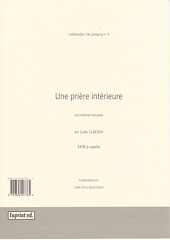



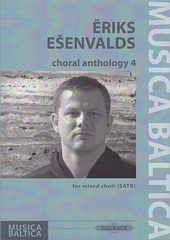






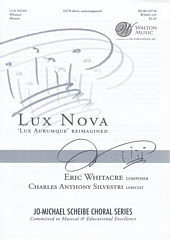
![Gunjo (Azure) [SAB]](/product_img/15180.jpg)

